Zvezda 1/72 MiG 1.44
|
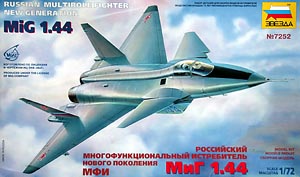 |
Overview
The need for top-line fighter aircraft is a given, and over the years
the Soviet Union (and now Russia) has pushed the envelope with new designs.
In the 1970s this resulted in the development and building of fourth
generation fighters such as the MiG-29 and Su-27, but the designers did
not stop there. Mikoyan Gurevich started designing their multipurpose
fifth generation fighter, the MiG 1.44. Built under heavy secrecy, it
is designed to have supersonic cruising ability and high maneuverability.
The first prototype was revealed to the public in 1999 and the first
test flight took place on February 29, 2000. The future of the MiG 1.44
is uncertain, though, and only time will tell whether the 1.44 will enter
into production.
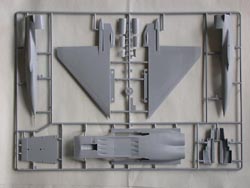 The Kit The Kit
Zvezda went all out with this kit of the MiG 1.44, stating in the instructions
that it was "developed with the full cooperation of the Mikoyan-Gurevich
Design Bureau." The instructions further state that the kit "incorporates
all current unclassified information and was approved by MiG." It
is nice to see an aircraft manufacturer taking such a personal interest
in the making of an accurate model, rather than just sitting on high
and demanding royalties. At any rate, the kit comes molded in a light
gray plastic with recessed panel lines, with a small clear sprue containing
the canopy. On first look, this is a BIG airplane! I would place it somewhere
in between the MiG-29 and Su-27, and put it closer to the Su-27 in size.
The detailing throughout is petite and easily rivals that of mainstream
Western manufacturers.
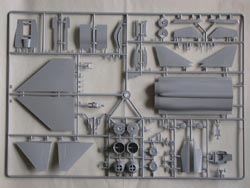 Construction starts with the cockpit, and this is probably one area
where the classified material rears up. The cockpit tub is very basic,
with decals for the instrument panel and side consoles. The seat is made
up of four pieces, but has no seat belts. A separate control stick finishes
up the interior, unless you want to put the included pilot figure in.
The finished cockpit is sandwiched between the two nose halves, hinting
at the complex assembly ahead. Construction starts with the cockpit, and this is probably one area
where the classified material rears up. The cockpit tub is very basic,
with decals for the instrument panel and side consoles. The seat is made
up of four pieces, but has no seat belts. A separate control stick finishes
up the interior, unless you want to put the included pilot figure in.
The finished cockpit is sandwiched between the two nose halves, hinting
at the complex assembly ahead.
Once the nose is together (and be careful, because the nose two-boom
pitot arrangement is molded in place), it is time to start piecing together
this complex aircraft. The underside of the nose has a separate upper
intake plate, which gets a separate splitter plate and curved intake
'roofs'. This completes the nose assembly, as the rest of the intake
assembly is made up from the main body.
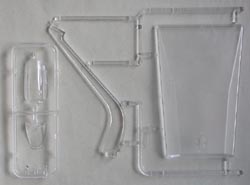 The main body is split into an upper and a lower half. The lower half
has separate main gear well inserts, as well as an insert for the lower
intake ramp. Separate burner cans and engine faces also fit onto the
lower section. The upper right and left wings have large tabs with pegs
to guarantee a solid attachment between the upper and lower fuselage
halves. Once the rear fuselage is together, the front fuselage fits in
place, and the intake sides finish out the main assembly. The main body is split into an upper and a lower half. The lower half
has separate main gear well inserts, as well as an insert for the lower
intake ramp. Separate burner cans and engine faces also fit onto the
lower section. The upper right and left wings have large tabs with pegs
to guarantee a solid attachment between the upper and lower fuselage
halves. Once the rear fuselage is together, the front fuselage fits in
place, and the intake sides finish out the main assembly.
The vertical fins are canards are separate and are solid right and
left pieces. There are two styles of burner cans included, and the instructions
indicate that they can be positioned at off-angles in the vertical plane.
The landing gear is robust and well detailed, and the canopy has separate
opening arms. For the underside, there are various wing fittings and
rear strakes, while the nose gets a couple small antennae.
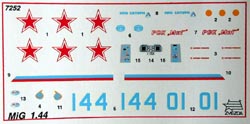 For colors and markings, this is a pretty simple one to finish up.
The camouflage scheme is a blue underside and a light gray upper, with
a hard demarcation between the two. There is a choice of either blue
01 or blue 144 for numbers on the intakes, with blue 144 having blue/red/white
stripes on the vertical fin. Other than that, there is not much in the
way of markings on this plane. Flight of fancy people could go wild,
though, and I would not be surprised to see one of these painted up in
a fancy Indian paint scheme, or maybe an African camouflage. For colors and markings, this is a pretty simple one to finish up.
The camouflage scheme is a blue underside and a light gray upper, with
a hard demarcation between the two. There is a choice of either blue
01 or blue 144 for numbers on the intakes, with blue 144 having blue/red/white
stripes on the vertical fin. Other than that, there is not much in the
way of markings on this plane. Flight of fancy people could go wild,
though, and I would not be surprised to see one of these painted up in
a fancy Indian paint scheme, or maybe an African camouflage.
Conclusion
This is a welcome kit, even more so knowing that Zvezda worked with
Mikoyan Gurevich to make it an accurate model. The simplicity will appeal
to those who want a quick build, while those who want to do more can
detail to their heart's content. My thanks to Squadron for the review
sample.
|
|
